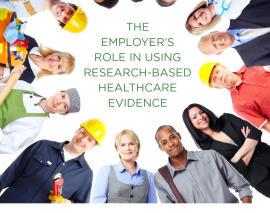Resources
Resources
Here you'll find new evidence and guidance from various sources across a variety of conditions of relevance to different audiences.
Resource
VR In The Workplace

Resource
Study Summary: Complex Case Management and New Technology

Resource
Population Health to Personalized Medicine: Connecting Disease Indicators to Work Outcomes - Diabetes

Resource
How Employers Use Evidence to Make Employee Health Investment Decisions

Resource
Tackling Chronic Pain While Reducing Opioid Use

Resource
Linking Community-Based Organizations with Each Other, and with Hospitals and Health Clinics, to Help Connect Patients with the Services They Need
Resource
Can Coping-Skills Training Help Patients Who Have Received Intensive Hospital Care to Cope with Depression and Anxiety?
Resource
Is a Patient Navigation Program More Helpful than a Referral Program for Reducing Depression and Improving Quality of Life among Women Living in Neighborhoods with Few Resources?
Resource
Pilot Project: Predicting Who Will Respond Best to Medical Treatments
Resource
Helping Adults with Serious Mental Illness Improve Their Health and Wellness
